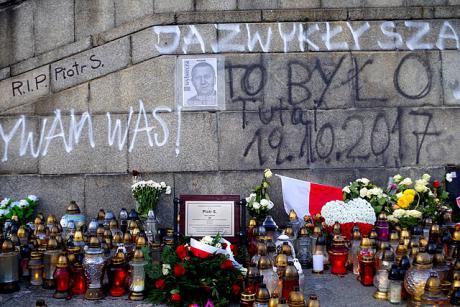
There is agrowing atmosphere of hatred in which anyone who opposes the current governmentis labeled the ‘worst sort’, or even ‘Soviet murderers’.
Thursday October, 19 at 16.30: An ordinary day, an ordinary man stands on the steps of the Warsaw Palace of Culture and Science. He is reading something through a megaphone to inattentive passers by. Just another protesting voice in the Polish capital. Except, once finished, this 54 year old man, who would become known for some time simply as Piotr S., then sets himself ablaze, performing an act of self-immolation to the sound of a song by ‘Chłopcy Placu Broni’ coming from a tape-recorder.
‘Freedom. I love and understand freedom. I don’t know how to give it up…’ On the ground lie strewn the pieces of paper from which he had been reading – a manifesto outlining 15 points of protest against the ruling Law and Justice Party (PiS). Ten days later, on October 29, he dies in hospital. It begins to sink in that this was a decisive, considered and dramatic political act. Where at first the media and politicians stay largely silent, following his death they now rush to assess his sanity, his past and his intentions.
All this he foresaw. He openly admitted that he struggled with depression for eight years – but this was nothing to do with that, though he knew politicians would try to make it so. Depression does not equal derangement. So how should he be understood?
Read doctoral student Irma Allen’s full post here: Poland on fire: voices from the provinces | openDemocracy


No comments yet. Be the first to comment!